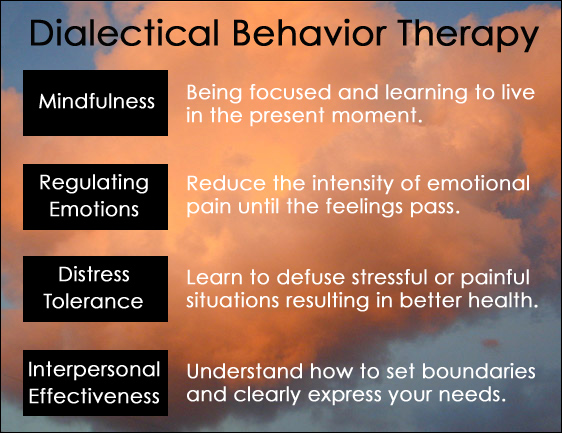

Rather, they are providing an adaptation or modification of DBT. It is important to note that any facility or clinician that does not offer all of these four major components, is not offering comprehensive DBT. Finally, the weekly consultation team is designed to help therapists get the support they need for treating suicidal clients as well as increase their motivation and adherence to DBT principles. Therapists make themselves available between sessions for consultation to help the clients apply new skills to prevent the use of problematic behaviors. The skills-training component of DBT involves teaching the individual specific skills designed to help improve their life in four major areas: mindfulness, emotion regulation, interpersonal effectiveness, and distress tolerance. The content of the therapy session generally revolves around targeting a high-priority event that occurred within the past week, helping the individual identify all the factors that led up to and followed the event (via a process called “behavioral analysis”) and then determining and practicing new ways of responding in the similar situations. Individual therapy occurs at least once a week. Weekly therapist consultation meeting in which DBT therapists meet to discuss their DBT cases As-needed consultation between client and therapist outside of sessionsĤ.

Weekly skills-training sessions, usually in the form of groupsģ. In its standard, outpatient form, DBT has four major components:ġ. Since DBT was developed for individuals with severe and persistent suicidality, it tends to involve greater commitment on the part of therapists and clients alike to work towards developing a satisfying and meaningful life so suicide does not appear to be a good alternative to living. Linehan would say, “a life worth living.” What Does DBT Involve? The overarching goal of treatment with DBT is to help individuals develop, as Dr. The central dialectic within DBT is to balance acceptance of the person exactly as s/he is in this moment with intense efforts to change the person’s life to increase adaptive functioning and decrease maladaptive behavior. Although initially intended to help chronically suicidal individuals diagnosed with borderline personality disorder (BPD please refer to the accompanying fact sheet for information on BPD), DBT has since been adapted for and used to effectively treat a number of other psychological problems. DBT was originally developed in the 1980s by Marsha Linehan, a psychologist at the University of Washington.

ABCT 2022 Convention Call for Abstracts.

Gaining Experience While in Graduate School.Administrative Leadership in Psychology.Cognitive and Behavioral Practice Journal.Teaching Exercises, Demos & Assignments.Training in Evidence Based Behavioral Practice.Search through our directory of local clinicians. Information on Opioids and the Opioid Crisisįact Sheets provide an introduction to disorders, their symptoms, and likely treatment approaches.ABCT Task Force for Equity, Inclusion, and AccessĪBCT news and position statements on current events and issues shaping the world around us.


 0 kommentar(er)
0 kommentar(er)
